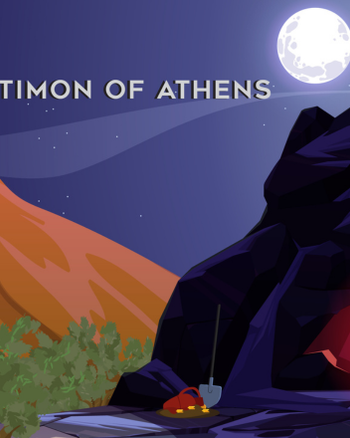Timon of Athens: A Problem Play or a Timely Message for Modern Society?

This season, the Festival presents Timon of Athens for only the second time in its 62-year history, and that was 30 years ago, in 1993. Although rarely-performed, deemed to be unfinished, and one of Shakespeare’s least popular works, this “problem play” may have the timely and valuable message just right for us today. And if you’re a die-hard Shakespeare fan, now is the time to add this show to your to-do list.
We watch throughout the play as this title character helps his supposed friends and is generous with gifts. But after ignoring warnings from his true friends, Timon faces a tragic ending and learns a valuable lesson about true friendship and a materialistic society. Here are some more things you may not know about Timon of Athens:
- William Shakespeare wasn’t the only playwright for Timon of Athens. It is theorized that Thomas Middleton, an English Jacobean playwright and poet, also worked on the play. Scholars’ critique of the “unevenness” of the play may be attributed to the fact it could have been written by two authors. Director Lisa Peterson, however, loves that Shakespeare collaborated with the younger writer and found new ways to tell stories.
- The play shares themes from Shakespeare’s King Lear. Both plays focus on ingratitude: the two lead characters also house anger against the selfishness and hypocrisy of mankind. Peterson believes that Timon of Athens and Coriolanus also share similar themes, asking the question “what does society owe to our remarkable individual and what does that individual owe to society?”
- During Shakespeare’s time, the slang term “Timonist” was used for someone who was unsociable.
- The real Timon of Athens wasn’t unsociable, however, living in the fifth century– placing him as a contemporary of Socrates and Pericles.
- Many scholars consider the play unfinished—or perhaps “unpolished” is a more fitting description. There is no evidence that it was performed in Shakespeare’s time, and until the last twenty years, very few scholars gave it much attention. Still, it is one of Shakespeare’s most rarely-performed plays, along with Coriolanus.
- Although it is categorized as one of Shakespeare’s tragedies, it’s argued that the play may be more fitting as a satire, because of the harsh perception Timon expressed of human nature. Because Timon of Athens doesn’t fit neatly into a category, it’s often called one of the Bard’s “problem plays.” Peterson certainly regards it as one of Shakespeare’s most experimental plays.
- The cave Timon retreats to is symbolic for the emotional isolation he feels. Similarly, the fate of his acquaintance Alcibiades is meant to mirror Timon’s.
- The word “dog” is used often throughout the play, and critics argue whether this was an insult or a compliment. In the play, it is used by Apemantus about Timon’s friends and is clearly meant as an insult, but William Empson, who wrote The Structure of Complex Words argued that dogs “flatter men because they want attention, but also out of genuine affection.” To further complicate the debate, later in the play, dogs are placed above men and are said to be what men should aspire to.
- Timon has an interesting approach to friendship, using gifts to create what he thinks is “true friendship.” However, he refuses to accept gifts in return and views gift-giving as a sort of competition for prestige. Similarly, Queen Elizabeth I and King James I used lavish gifts to entice nobles and ultimately ended up in debt, like Timon.
- Although Timon of Athens reveals how a materialistic society that is money obsessed is corrupting and reflects the Elizabethan and Jacobean nobles of the time, it may be the perfect play for today’s age. Critics argue that an American capitalist society could learn a thing or two from the play.
The 2023 season of the Utah Shakespeare Festival begins June 21 and runs to October 7 and features Romeo and Juliet, A Midsummer Night’s Dream, Jane Austen’s Emma The Musical, A Raisin in the Sun, The Play That Goes Wrong, Timon of Athens, and Coriolanus, as well as all numerous experiences surrounding the plays, such as The Greenshow, seminars, orientations, and backstage tours.








